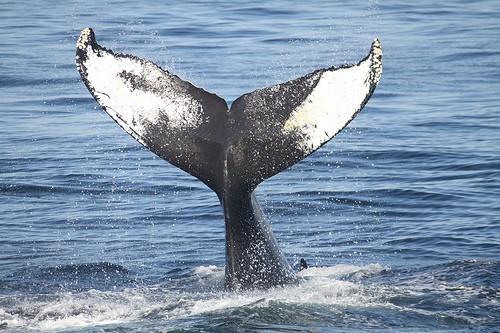Conservationists Vow to Fight South Korean Plans for 'Commercial Whaling in Drag'
Australia and New Zealand join WWF and Greenpeace against plans, which they declare are 'commercial whaling in drag'

South Korea has been criticised by conservation groups for proposing to resume whaling for scientific research, which Greenpeace claimed is "commercial whaling in another form".
Other nations joined conservationists in criticising the proposal, which aims to exploit a loophole in the ban on commercial whaling that has been in place since 1986.
Australian president Julia Gillard pledged to fight the proposal, which was announced at a meeting of the International Whaling Commission (IWC) in Panama City.
"There is no excuse for scientific whaling," Gillard said in Melbourne.
The practice of scientific whaling was introduced by Japan in 1987 after the IWC imposed a ban on commercial whaling in 1986.
A scientific permit of exemption from the ban is used by both Japan and Iceland.
The exemption is a provision within the International Convention on the Regulation of Whaling, which allows nations to conduct scientific studies. After the whale carcasses are studied and processed, they can then be sold on the commercial market.
South Korea has joined Japan in claiming that whaling is a cultural tradition for the country, while it seeks to monitor the impact of whale populations on its fishing industry.
Whale meat is viewed as a delicacy in South Korea, which used to catch an average of 600 minke whales a year before the ban was imposed. Minke whales that are caught accidentally or wash ashore can be legally sold.
A South Korean representative for the Food Agriculture, Forestry and Fisheries Ministry announced: "We've submitted a proposal to the IWC's scientific committee to resume scientific whaling in our waters and will await the committee's assessment.
"If it says it is not adequate in their assessment of the legitimacy of scientific research, we'll make further preparations."
Conservationists have repeatedly asked for the loophole on whaling to be closed. Since the 1986 moratorium, Japan has killed more than 8,200 minke whales in the Antarctic. Protesters have pointed to a 75 percent drop in whale meat sales over the last year as a sign that the appetite for whale meat is disappearing.
However, South Korea argues that its fishermen are struggling with depleting fishing stocks, brought about by booming whale populations.
The global conservation group WWF refutes the claim, which it argues has no scientific foundation. Heather Sohl, of WWF-UK, said: "The resumption of whaling by Korea after a quarter of a century would be a huge step back for the IWC.
"Korea already sells meat from whales caught in fishing gear and we believe this move is a thinly veiled attempt by Korea to conduct commercial whaling under the guise of scientific research, similar to hunts conducted by Japan in the Southern Ocean whale sanctuary.
"This type of senseless proposal derails the important work of the IWC on conservation issues of critical importance to whales, dolphins and porpoises. Conservation of threatened whale species is something all countries should be able to agree on."
James Lorenz, from Greenpeace, said the scientific exemption was "commercial whaling in another form".
He told Australian television: "It is an absolute shock that this happened at this meeting and it's an absolute disgrace, because to say that hunting wales is is happening in the name of science is just wrong."
Increased whaling activity would inevitably lead to increased clashes with protesters, who take to the water to disturb whaling sorties.
Former Australian environment minister Ian Campbell, who is now on the board of the ant-whaling craft Sea Shepherd, told Reuters that it would "have to get organised to go out to the oceans and save the whales off South Korea".
A statement released by new Zealand foreign minister Murray McCully claimed: "The portrayal of this initiative as a 'scientific' programme will have no more credibility than the so-called scientific programme conducted by Japan, which has long been recognised as commercial whaling in drag".
South Korea's proposal at the commission follows the failure of a proposal to have the southern Atlantic made a whale sanctuary.
The WWF claims the minke whales that would be taken in any proposed hunt are considered endangered by the IWC scientific committee.
© Copyright IBTimes 2025. All rights reserved.





















